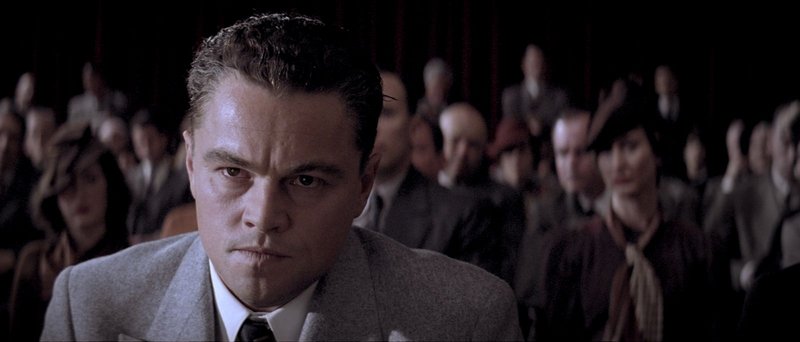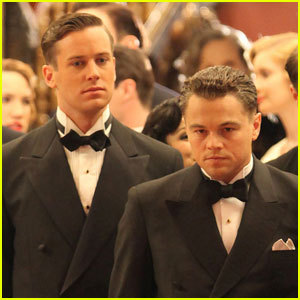In the 1959 film “The FBI Story,” Federal Bureau of Investigation director J. Edgar Hoover — photographed from the rear, his face unseen — plays a younger cameo version of himself, speaking to agents (James Stewart among them) about the newly formed agency and how its operation will remain free of all politics and the whims of any one presidential administration. Hoover, following the Hoover-approved script, then expounds on the “love of justice.” He says: “I warn you now. That is the most demanding of affections.”
Make that the second-most demanding. For more than half a century, speculation regarding Hoover’s private life has focused on whether this bulldog of all-American virtue knew an even more formidable affection — fraught with secrecy, given the times and Hoover’s public profile, and wrapped in layers of emotional and sexual denial.
Director Clint Eastwood’s “J. Edgar,” featuring a valiant performance from Leonardo DiCaprio, is a demure, rather touching inquiry into this possibility. Molded by the presence, and then the absence, of a smothering mother (Judi Dench) who at one point says she’d “rather have a dead son than a daffodil for a son,” Hoover ran the FBI and amassed confidential, politically explosive files on a universe of dissidents and enemies from 1935 until his death in 1972. (Hoover also ran the comparatively toothless precursor to the FBI for more than a decade.) Did this power broker’s longtime working friendship with assistant Clyde Tolson constitute the one great love of his life, sexually intimate or no?
Constructed as an elaborate interweave of flashbacks, starting with the Red Scare “Palmer raids” of 1919 and 1920, the movie poses many questions. But rarely does this central question relating to Hoover, Tolson and what was between them fade entirely.
In recent interviews for the film, Eastwood has done his best to dismiss his own biopic’s inferences, saying among other things that the movie’s not about “two gay guys.” (Which sounds like the title of a new CBS sitcom.) All the same, the film’s screenplay, from Oscar-winning “Milk” scribe Lance Dustin Black, is very much interested in Hoover’s intimate relationship with Tolson, an Arrow Collar ad come to life in the hands of Armie Hammer. It is very much concerned with how Hoover’s various facets coexisted in the same psyche: Hoover the closeted homosexual, Hoover the rustler of radicals and pinkos, Hoover the one-time paramour of Dorothy Lamour, (the film glances briefly on this), Hoover the martinet and blackmailer and mother’s son.
Imagine how Oliver Stone might’ve handled this material (he got his own licks in with “Nixon,” in which Bob Hoskins played Hoover as a sniveling wart hog of a bureaucrat), and whatever your mind’s eye sees in terms of hysteria and aggressive visual technique, you’ll get the opposite in Eastwood’s dispassionate approach.
“J. Edgar” suggests, convincingly, that Hoover was in love and felt he couldn’t do anything about it except spend as many meals and vacations and days and weeks and years with Tolson as he could manage. Tolson, screenwriter Black infers, was more willing to speak the love that dared not speak its name. We see, briefly, a hand-clasp in the back of a limousine. And in one startling and shrewdly staged hotel-room encounter, Tolson — fed up with Hoover’s inability to come clean about his desires — turns on his superior, which leads to a fight, which leads to a single, angry kiss.
For much of the film Eastwood’s studiously objective stance sets the tone for the story of a man whose misdeeds and hypocrisies are perhaps too discreetly handled. In the hotel room scene, however, as in the other “talking point” moment (involving the shaky old rumor about Hoover and cross-dressing), “J. Edgar” brings out the best in both DiCaprio and his director.
This may be a closety film about a closety character, but the tensions between Eastwood’s direction and the script he’s directing keep us off-guard in an intriguing way. The results, whatever one thinks of them, may be square, but they’re all of a piece. Eastwood’s house style remains very much in the house here. Cinematographer Tom Stern’s hot, flat, chalky-white lighting pours into every interior, while Eastwood’s self-penned musical score (a key theme borrowing the first three notes of Duke Ellington’s “Solitude”) stresses the tender side of its subject, at any cost.
Is DiCaprio an ideal choice for Hoover? No. The old-person makeup (Naomi Watts, second-billed, does what she can as Hoover’s devoted secretary and secret-hoarder) is asked to cover a lot of decades. DiCaprio doesn’t easily suggest a jowly, aged presence. His boyishness, in the face and in the voice, limits the actor’s range. (I had similar trouble buying him in parts of “The Aviator” as Howard Hughes.) Yet his skill set remains formidable, as does his sense of adventure.
I like the way DiCaprio and Hammer capture the little things — the byplay, the moments in which two men are “playing” FBI agents, partly for show, partly for real. At times, DiCaprio’s macho posturing recalls a junior G-man version of Marlon Brando’s self-hating homosexual in “Reflections of a Golden Eye.” Eastwood can say what he likes in interviews. His film, at its slyest, says something else.
Send questions/comments to the editors.




Success. Please wait for the page to reload. If the page does not reload within 5 seconds, please refresh the page.
Enter your email and password to access comments.
Hi, to comment on stories you must . This profile is in addition to your subscription and website login.
Already have a commenting profile? .
Invalid username/password.
Please check your email to confirm and complete your registration.
Only subscribers are eligible to post comments. Please subscribe or login first for digital access. Here’s why.
Use the form below to reset your password. When you've submitted your account email, we will send an email with a reset code.